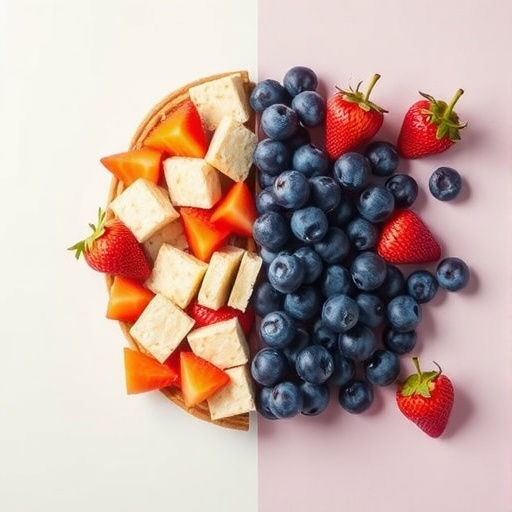In a groundbreaking study published in the Journal of Eating Disorders, researchers Levinson, Parker, Hunger, and their colleagues explore a relatively overlooked cognitive phenomenon in the realm of eating behaviors: dichotomous thinking about food. This study shines a light on how binary or “black-and-white” thinking can influence individuals’ relationships with food, and consequently, how it can contribute to the development of disordered eating attitudes and behaviors.
Dichotomous thinking, a cognitive distortion often seen in various psychological conditions, manifests in the way individuals categorize foods as either “good” or “bad.” This binary classification can significantly impact one’s eating behaviors by promoting guilt, anxiety, and an unhealthy preoccupation with perceived food transgressions. The study highlights the importance of understanding this cognitive bias not only in clinical populations but also in the broader context where subclinical eating issues emerge.
The authors of the study sampled a diverse group of participants to investigate the prevalence and implications of dichotomous thinking about food. Their findings suggest that this type of cognitive distortion is more widespread than previously believed, particularly among young adults and adolescents. By gathering extensive data on participants’ eating habits and cognitive patterns, the researchers established a correlation between dichotomous thinking and the presence of disordered eating attitudes, emphasizing the necessity for further research in this area.
One of the major contributions of this research lies in its identification of the nuanced ways dichotomous thinking can manifest across different populations. Participants with a tendency to engage in all-or-nothing thinking about food often reported experiencing heightened levels of guilt and shame following food consumption. This emotional turmoil appears to perpetuate a cycle where individuals oscillate between restrictive eating and binge eating, ultimately leading to a disordered relationship with food.
Researchers utilized a variety of empirical methods to draw their conclusions. They conducted quantitative analyses to assess the prevalence of dichotomous thinking and its impact on eating behaviors. Additionally, qualitative interviews enriched their findings, allowing for deeper insights into how individuals experience these cognitive distortions in real-life situations. Such a mixed-methods approach enables a more holistic understanding of the relationship between cognition and eating behaviors.
In discussions surrounding mental health and wellbeing, the role of cognition in eating patterns is often overlooked. However, this study brings to the fore the critical need to integrate cognitive behavioral approaches into prevention and treatment strategies for eating disorders. By addressing cognitive distortions like dichotomous thinking, mental health professionals can provide more effective interventions aimed at fostering a healthier relationship with food.
As a contentious and vital issue within society, disordered eating behaviors are gaining increasing attention. This research contributes to a more comprehensive understanding of the factors that underpin these behaviors, particularly how societal pressures and personal beliefs intertwine. The implications of dichotomous thinking extend beyond individual experiences, potentially influencing socio-cultural attitudes toward food and body image.
The findings of this study may also hold relevance for educational institutions and organizations aiming to promote healthy eating habits among youth. By incorporating discussions about cognitive biases related to food into educational programs, there’s a potential to mitigate the risk of developing disordered eating behaviors. Understanding that food is not simply categorized as “good” or “bad” could empower individuals to make more balanced decisions regarding their diets without succumbing to the pressures of idealistic standards.
Moreover, the study’s authors raise the issue of media portrayal of food that often reinforces such dichotomous thinking. The imagery and language surrounding food in advertisements, social media, and even in nutritional guidelines frequently contribute to the misunderstanding of food’s role in our lives. By challenging these societal norms, the research advocates for a broader perspective on food that encompasses moderation, variety, and pleasure.
Interestingly, the concept of intuitive eating emerges as a counter-narrative to dichotomous thinking. By promoting the idea that individuals can trust their bodies to guide their eating behaviors, the intuitive eating approach encourages a more mindful and compassionate relationship with food. This perspective aligns with the research findings, suggesting that educational efforts should focus on fostering intuitive eating principles rather than rigid guidelines that enforce dichotomous categorization.
The implications of this study reach far beyond academic circles; they provoke critical conversations about our collective relationship with food. Given the alarming rise in eating disorders globally, particularly among younger demographics, understanding the cognitive mechanisms that contribute to these issues is imperative. By targeting cognition, researchers and practitioners can work to dismantle harmful beliefs that affect eating habits and overall psychological wellbeing.
In conclusion, the research conducted by Levinson and colleagues illustrates the profound effects of dichotomous thinking about food. Their findings call for an urgent reevaluation of how we approach education, prevention, and treatment concerning eating behaviors. As society grapples with issues surrounding obesity, dieting, and mental health, it becomes increasingly important to recognize and address the cognitive biases that shape our food-related choices and attitudes. The future of food perception and eating behaviors may depend on our ability to move beyond black-and-white thinking to foster a healthier and more inclusive understanding of food.
Subject of Research: Dichotomous thinking about food as a subclinical disordered eating cognition.
Article Title: Dichotomous thinking about food as an understudied subclinical disordered eating cognition.
Article References:
Levinson, J.A., Parker, J.E., Hunger, J.M. et al. Dichotomous thinking about food as an understudied subclinical disordered eating cognition.
J Eat Disord 13, 224 (2025). https://doi.org/10.1186/s40337-025-01388-7
Image Credits: AI Generated
DOI: 10.1186/s40337-025-01388-7
Keywords: dichotomous thinking, food cognition, disordered eating, eating behaviors, cognitive distortions, intuitive eating.




